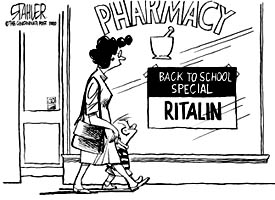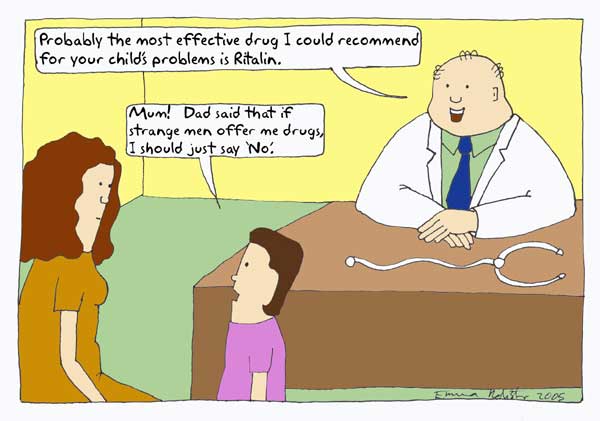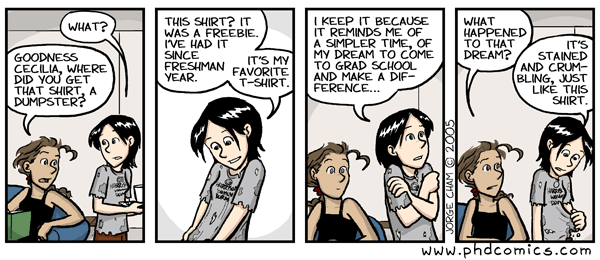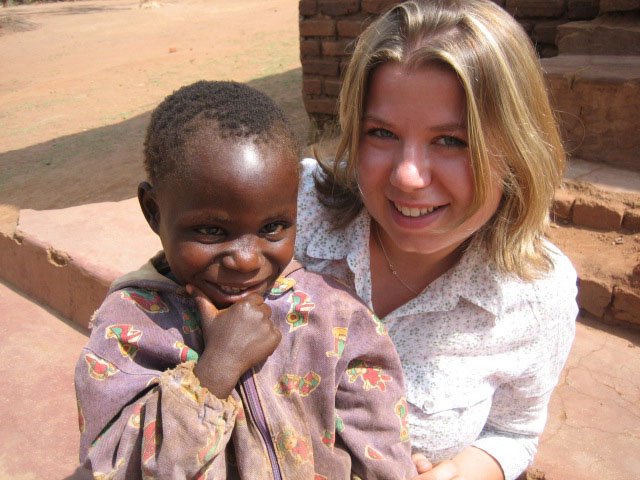
I've spent the past 3 years of my life studying ADHD - more specifically, I study how family factors impact on children and parents' attitudes to medication - particularly around issues of stigma associated with taking medication. ADHD is a real hot potato at the moment. Some don't believe in it, some are adamant that it is a neurochemical disorder and therefore can only be treated by neurochemical means. Others say it is a social construction, designed to oppress masculinity.
Recently I have been feeling frustrated...Let me re-phrase, at times I have been feeling downright angry at my own situation as a psychologist in an increasingly medical-model dominated (did I say dominated, I mean monopolised) research group. My skepticism has been growing at an exponential rate. So I thought I would record my random thoughts on my blog and invite my blog readers - informed or not, to comment. I know there are some people with ADHD who read my blog, at least one other psychologist and goodness knows who else. So please...Feel free to contribute.

I will talk about genetic and neurochemical approaches to ADHD and their limitations. I will talk about the implications of research funding for the kind of research we do and how we interpret it. I will take about the critical voices and how perhaps they aren't quite so critical afterall. I will talk about a need for genuine reflection on the social and cultural aspects of ADHD and ask if there are other ways of responding outside the medical model. And as this is my blog, not an academic paper, I will intersperse it with little cartoons for amusement value...enjoy!

Ok, so. Firstly there is some evidence for a genetic basis but equal evidence that genetics are far from being the whole story. Whatever the genetic component of ADHD, it is entangled with other environmental and social factors and this should never be forgotten in genetic research.
Secondly there is evidence of neurobiological correlates to ADHD symptoms. These shouldn't be ignored, but in themselves I don't think they legitimise drug therapy.
Thirdly, medication (e.g. ritalin) does have a beneficial impact on children who have been diagnosed with ADHD. We know this both from clinical trials and from the experience of countless parents and children. HOWEVER, the is a real issue of publishing bias. Almost every researcher in this field (myself included) is funded, at least in part, by pharmaceutical companies. Basically no drug company money, no jobs.
Whether we are aware of it or not, the fact that most research and most researchers are dependent on financial contributions from the pharmaceutical industry effects what we publish, what we research, how we research it and how we interpret it. I've yet to hear a drug-company funded researcher really give an open and critical reflection on these issues. More to the point, I do not feel comfortable bringing up these ideas within my research group as I know they would not be welcome. They would be deemed wacko and far too political. I think, that says it all really. My PhD research has not encouraged me to think critically around these so vital issues.

There are people who write very critically about ADHD and drug treatment. However, most papers in this field are highly emotive and fail to seriously engage with issues of genetics, neurochemistry and research highlighting the potential benefits of medication. I suspect the motivation behind most of the opposition is a philosophical objection to psychtrophic medication rather than a pure concern for child welfare. Let me be frank, the critical psychologists aren't helping themselves be heard, and IMHO, their over-emotive and scientifically inaccurate ranting represent a serious barrier to intelligent dialogue and discussion.

Nevertheless, I think many of them have points that are worth listening to. As a disorder, ADHD is shockingly ill-defined and it is really more of an umbrella term for a set of behaviours and cognitive symptoms that are currently socially devalued. ADHD is culturally defined and constructed - lets never forget this. ADHD symptoms are problematic in a social context. The history of psychiatry should humble (or maybe even humiliate) us into a bit self-critical reflection every now and again! It wasn't that long ago we thought gayness was a psychiatric disease and transsexuality is still in the diagnositic handbook! (That's a whole other discussion - but I think it ought to be removed - sharpish!)

It is possible that the social disapproval and resulting stigma and systematic exclusion of children who have ADHD symptoms may cause more distress than the ADHD symptoms themselves per se. Therefore the social-constructionists amongst us really do have an important contribution to make, and I think we do need to think on a systemic and community level regarding ADHD. Are the demands we put on our children reasonable? Do we allow our children space to be themselves (whatever that means)?
Do we utilise our children's natural abilities and aptitudes in order to maximise their enjoyment and development? Personally, I'm very interested in interactive and kinetic teaching methods and how these might help a lot of children learn in a more dynamic way that suits their temperament and fosters their unique talents.

In discussions with psychologists, social workers and teachers, I have often encountered an incredibly negative reaction to medication for ADHD. Again, I suspect this is an emotional, philosophical reaction. Parents are often blamed and medication is seen as an easy option. However, I think parent-blaming is unacceptable and the vast majority of parents I know, think long and hard and really battle with themselves before accepting medication for themselves. Often it is used as a last resort (which may not be particularly helpful or wise.)

At the moment, there was very little evidence as to the effectiveness of psychosocial interventions for ADHD. BUT, success in psychosocial intervention trials is often measured in medical model terms, focusing on symptom reduction. Psychosocial intervention needs to be tailed to the individual, familial, social and cultural situations of each child & family (and school for that matter). Therefore, randomised controlled trials may not be the ideal methodology for research in psychosocial intervention, and measuring success in medical model terms is outright ridiculous as our aim is often to reduce the distress associated with ADHD symptoms rather than "curing" the symptoms themselves.

With regard to medication, I do think there is a need for serious reflection and discussion on the social and psychological impact of taking psychotrophic medication in childhood (and in adulthood - and for any kind of mental disorder). Personally, I am convinced that taking medication has psychological and social repercussions for the individual and for society quite separate from the pharmacological effect of the medication itself. (Is this hard to explain, because I once attempted to have this conversation with my supervisor and he acted like I was suggesting leprechauns were real?). What does taking medication for behaviour mean to a child? To a parent? To a teacher? To a peer group? How does it impact on a child's sense of self? Does is lead to stigma? These are very real issues not only for people who take medication or whose children take medication - these are issues for all of us and how we all think about our own behaviours and our own interaction within society and response to those individuals who find themselves diagnosed with a mental illness or taking psychotropic drugs.

Finally - where is the ADHD advocacy movement? In autism there is a growing movement seeking to value neurodiversity. I recently read an article written by an autistic man who insisted he wasn't a man with autism (the current language in vogue amongst the politically correct) but an autistic man. His autism was a part of his identity and he was proud of it. That's challenging to me as a psychologist about to take a job where some of my clients will have autism.

But what are the unique skills and attributes of children and adults who could be diagnosed with ADHD. How can these be valued and encouraged within our society? Many adults and older teenagers I have met with ADHD say they would never want to be "cured" - but where are their voices, and will researchers, psychiatrists, psychologists, teachers and parents be brave enough to listen?

 I called my grandparents this afternoon and got into a conversation with my gran about the X-factor and made a shocking discovery.
I called my grandparents this afternoon and got into a conversation with my gran about the X-factor and made a shocking discovery. This is her with a very very cute kid. There are lots of very cute kids she's working with who lack even the very basics - clothes, writing materials, food, shelter, a family. Even a small gift means so much to these kids. So if you can spare a few pounds or dollars...then consider dropping a gift directly to Caroline. T-shirts, pens, pencils, little notebooks, silly toys for kids who will be going to their first ever party...Send it to her at
This is her with a very very cute kid. There are lots of very cute kids she's working with who lack even the very basics - clothes, writing materials, food, shelter, a family. Even a small gift means so much to these kids. So if you can spare a few pounds or dollars...then consider dropping a gift directly to Caroline. T-shirts, pens, pencils, little notebooks, silly toys for kids who will be going to their first ever party...Send it to her at  Well, I have received a number of lovely lovely emails from people lately in support of what I'm doing but a common thread that seems to be appearing in many of them is that people still want to help. First off, this amazes me since I am still overwhelmed by the donations and support I received when preparing to leave and now the ongoing generosity is genuinely moving.
Well, I have received a number of lovely lovely emails from people lately in support of what I'm doing but a common thread that seems to be appearing in many of them is that people still want to help. First off, this amazes me since I am still overwhelmed by the donations and support I received when preparing to leave and now the ongoing generosity is genuinely moving. I'm staring blankly at my application for clinical psychology training. Thus far, the one thing that has kept me going through my PhD - the possibility of getting to work with people at the end of it and suddenly I'm shitting myself.
I'm staring blankly at my application for clinical psychology training. Thus far, the one thing that has kept me going through my PhD - the possibility of getting to work with people at the end of it and suddenly I'm shitting myself.








